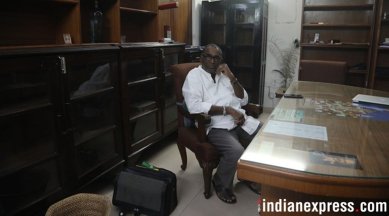Stay updated with the latest - Click here to follow us on Instagram
Justice Jasti Chelameswar prepares to leave Delhi days ahead of his retirement
From his contrarian stand in the NJAC ruling to the Judges’ Press Conference on 12 January 2018, the judge’s seven-year tenure saw some of the most polarising moments in the history of Indian judiciary.

After an eventful tenure in the Supreme Court, Justice Jasti Chelameswar has begun vacating his official residence in New Delhi ahead of his retirement on June 22.
The retiring judge has had an impressive track record. He served as an Additional Judge at the then High Court of Andhra Pradesh. He was made the Chief Justice of Guwahati High Court in 2007. He also served as the Chief Justice of the Kerala High Court. He was elevated as a judge in the Supreme Court in October 2011.
Justice Chelameswar, is the senior-most judge after the Chief Justice of India. The Supreme Court judge had earlier said he will be moving back to his hometown and has no plans to seek employment from the government after retirement.
An eventful tenure
From his contrarian stand in the NJAC ruling to a press conference on January 12, the Supreme Court judge’s seven-year tenure was filled with debated moments in the history of Indian judiciary.
The most dramatic moment during his tenure was perhaps the unprecedented press conference held by Justice Chelameswar and three other Supreme Court judges to make public a letter they had written to the Chief Justice about issues they felt were plaguing the nation’s apex court. The press conference was held at Justice Chelameswar’s residence.
His last day in court
Justice J Chelameswar on May 18 shared the dais with Chief Justice of India Dipak Misra on his last working day.
Justice Chelameswar was part of the bench headed by the CJI, along with Justice D Y Chandrachud, on his last working day before the apex court went on its summer vacation.
The judge refused the formal farewell from the Supreme Court Bar Association, like he did in the High Courts of Gauhati and Kerala where he served as Chief Justice.
His refusal to attend the farewell sparked speculation that he would not be a part of the bench with the Chief Justice.
Several senior lawyers paid their tributes to the judge on his last day in the apex court. A visibly moved Justice Chelameswar responded by thanking the Bar and conveying his apologies, if he had hurt anyone.
Justice Chelameswar left the courtroom with folded hands.
Significant judgments and orders
Justice Chelameswar had referred a Medical Council of India case to a particular bench, excluding the Chief Justice . The Chief Justice ordered an unprecedented reversal of the order and underlined his role as the Master of Roster being central and paramount.
Justice Chelameswar, in a judgment by him and Justice Rohington Fali Nariman, had opined in favour of freedom of speech in 2015 by striking down Section 66A of the Information Technology Act as unconstitutional. The clause had led to the arrests of several people for posting content deemed to be “allegedly objectionable”.
The judge was also part of a three-judge bench which had said that no Indian can be denied government subsidies and other services just because they do not have Aadhaar.
Justice Chelameswar had also given the only dissenting verdict in the NJAC (National Judicial Appointments Commission) case in which he observed that “proceedings of the collegium were absolutely opaque and inaccessible both to public and history”.